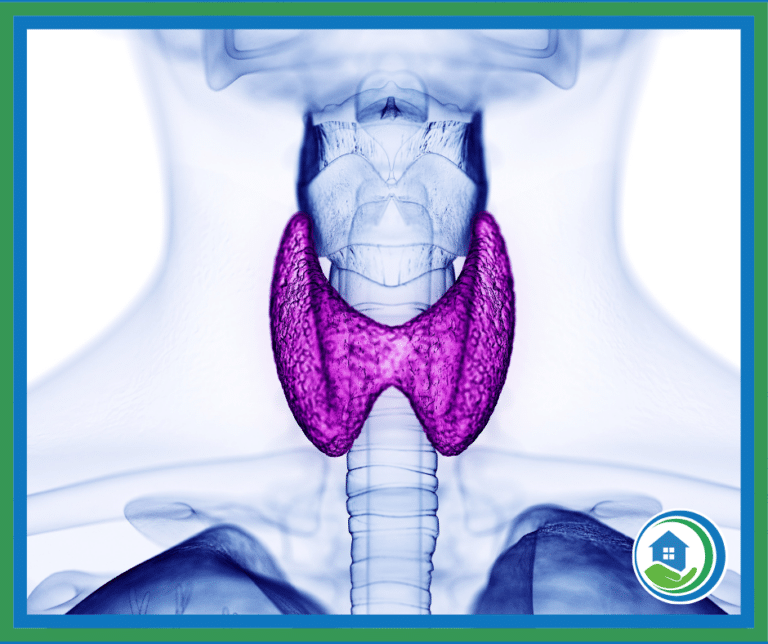Our bodies change dramatically as we age, and the thyroid gland is one region that is especially vulnerable. This butterfly-shaped gland, located in the neck, is responsible for controlling a variety of biological activities such as metabolism, energy, and temperature. Thyroid problems are not uncommon for seniors, and understanding the signs and symptoms can aid in an appropriate diagnosis and treatment. In this post, we’ll look at some of the most frequent thyroid diseases that seniors confront, as well as the warning indications and how home care can help.
Thyroid and Aging: Common Thyroid Problems
Before we go into specific thyroid disorders, let’s go over the basics. The thyroid gland generates hormones called triiodothyronine (T3) and thyroxine (T4), which regulate metabolism and influence important body activities. As people age, the thyroid gland’s shape and function may change, leading to a variety of thyroid problems, as seen below:
- Hypothyroidism: This syndrome develops when the thyroid gland produces insufficient hormones. Seniors with hypothyroidism may suffer from fatigue, weight gain, constipation, dry skin, hair loss, and cold intolerance. These symptoms can sometimes be mistaken for natural indicators of aging, making identification difficult without a professional medical evaluation.
- Hyperthyroidism: This condition occurs when the thyroid gland generates too many hormones. Symptoms in seniors may include weight loss, rapid heartbeat, anxiety, irritability, heat intolerance, tremors, and difficulty sleeping. These symptoms, like hypothyroidism, might be mistaken for other age-related illnesses if not thoroughly addressed.
- Nodules: Thyroid nodules are masses that develop inside the thyroid gland. While often benign, they can occasionally suggest thyroid cancer, particularly in the elderly. Nodules can be palpable lumps in the neck or discovered by chance during imaging examinations.
- Thyroid Cancer: Although thyroid cancer is relatively rare, its incidence rises with age. Symptoms can include a lump or enlargement in the neck, trouble swallowing or breathing, chronic hoarseness, and swollen lymph nodes. If any serious symptoms appear, seek immediate attention from a healthcare practitioner.
What Signs Indicate the Presence of Thyroid Issues?
Home care can educate loved ones and seniors about the signs they should watch for that might indicate an issue with the thyroid, such as the following:
- Weariness and Weakness: Consistent weariness and weakness, especially when they are present in conjunction with other symptoms, may be a sign of a thyroid condition.
- Issues with Mood and Mental Health: Thyroid abnormalities can cause mood swings, depression, anxiety, and cognitive problems.
- Heart Palpitations: Thyroid disorder can cause seniors to feel heart palpitations, a rapid heartbeat, or changes in blood pressure.
- Modifications in Bowel Habits: If constipation or diarrhea persists despite dietary modifications or medication, seek medical assistance.
- Temperature Sensitivity: Increased sensitivity to cold or heat may suggest thyroid dysfunction.
Thyroid problems are common among seniors, and early detection is critical for effective treatment and prevention of consequences. Senior home care can help seniors watch for signs there might be an issue with their thyroid as well as encourage seniors to talk with their medical team about any concerns they have. Routine check-ups and thyroid function testing can help with early detection and intervention, resulting in optimal thyroid health and general well-being in seniors.
If you or an aging loved one are considering Home Care in Richardson, TX, please contact the caring staff at Clear Path Home Care today at (888) 740-7023
Clear Path Home Care provides compassionate, high-quality home care in Wood County, Dallas County, Rockwall County, Kaufman County, Van Zandt County, Rains County, Henderson County, Navarro County, and Ellis County in Texas.
- How Senior Care Helps Seniors Live Alone Safely - May 14, 2024
- How to Manage Mood Swings as a Senior - May 2, 2024
- How 24-Hour Home Care Can Help Manage Chronic Conditions at Home - April 18, 2024






